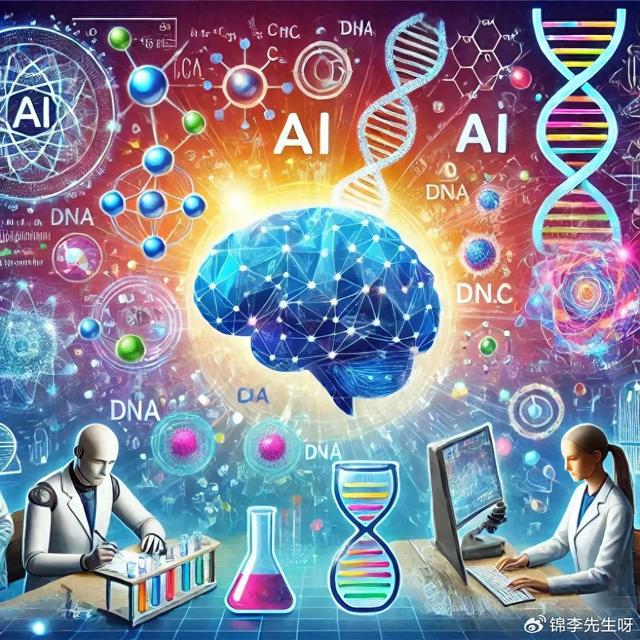The rapid development of AI technology has allowed us to see the infinite possibilities of technology. But have you ever thought that AI will one day win the Nobel Prize? The 2024 Nobel Prize in Chemistry and Physics will be awarded to several outstanding scientists because of the contribution of AI. This has also made many people start to think, will AI one day replace scientists?

AI wins Nobel Prize: AlphaFold leads the biotechnology revolution First, let’s take a look at the Google DeepMind team that just won the 2024 Nobel Prize in Chemistry. Damis Hassabis and John Jope used their AlphaFold2 model to predict the structures of more than 200 million proteins with over 90% accuracy. This is not a simple numbers game, but has brought about earth-shaking changes in life sciences.
You may not know that the study of protein structure has always been a major problem in the field of biology. In the past, it would take scientists years or even decades to decipher the structure of a protein. AlphaFold only takes a few seconds to complete. From this point of view, it is really expected that the Nobel Prize will be awarded to AlphaFold.
The physics prize also favors AI: the foundations of neural networks are laid by the same person. The 2024 Nobel Prize in Physics was also awarded to two pioneers in the field of AI-Professor John Hopfield of Princeton University in the United States and Professor of the University of Toronto in Canada. Professor Jeffrey Hinton. Why is their research relevant to physics? Because their breakthrough discoveries in artificial neural networks directly promoted the evolution of AI.
Artificial neural network has become the core technology of today's AI, and its inspiration actually comes from the connections between neurons in the human brain. Hopfield and Hinton’s research laid the foundation for deep learning. The voice assistants, autonomous driving, and image recognition technologies we commonly use today all rely on these neural network models.
Matt Strassler, a theoretical physicist at Harvard University, said that Hopfield and Hinton's work is interdisciplinary research, combining physics, mathematics, computer science and neuroscience, which also illustrates the relationship between AI and these Deep connections in fundamental disciplines.
Can AI replace scientists? Not so fast! Seeing this, you may ask, if AI is so powerful, will it replace scientists in the future? In fact, the answer is not that simple. Professor Dou Dejing, chief scientist of Nortel Digital Intelligence, said that AI has huge potential in many fields, especially models like AlphaFold, which have changed the way biological sciences are researched.
However, he also pointed out that AI’s contribution to physics is not obvious enough. Although AI can help us process huge amounts of data, for example, computer vision technology was used in the calculation and processing of mankind’s first black hole photo in 2017, but its role in promoting the discovery of basic principles of physics is not prominent enough. In other words, AI is more about helping scientists than completely replacing them.
AI bubble? How far away are practical applications? Despite the impressive performance of AI in the scientific community, many people are still full of doubts about the future of the AI industry. Will AI be just a gust of wind, a flash in the pan? In fact, Gartner's technology cycle report has already reminded that AI has passed the peak of excessive expectations and will enter the trough of disillusionment in the future. Simply put, many AI projects may fail due to high costs, poor data quality and other reasons.
For example, the cost of implementing a generative AI project is as high as several million dollars, and continuous investment is required every year, ranging from a few thousand to tens of thousands of dollars in budget. This is really unsustainable for many companies. Professor Dou Dejing of Nortel Digital Intelligence also pointed out that the current profit model of AI is still unclear. Many large-scale model projects require huge hardware investment and the payback cycle is very long.
However, what is worth looking forward to is that AI is accelerating its application. OpenAI's ChatGPT, Google's AI tools, Microsoft's AI assistant, etc. have already produced some preliminary commercial results in the industry. Professor Dou said that as AI technology matures in the future, there may be a business model similar to search engines that rely on advertising to monetize, but it has not yet fully emerged.
The huge potential of AI in the future: Not only is the commercial value of tool AI still being explored, but its potential in the scientific field cannot be underestimated. Alex Zhavoronkov, founder of Insilicon Intelligence, said that AI not only changes the speed of scientific research, but also gives small companies a chance to compete with large companies. For example, Insilico used AI to nominate 19 preclinical drug candidates and successfully advanced nine projects to the clinical stage. Such results are difficult for even large pharmaceutical companies to easily achieve.
In the future, AI will be integrated with more industries. From medicine to real estate to industrial manufacturing, AI application scenarios are almost endless. Alex believes that the success of AI lies not only in the technology itself, but also in talent and innovation capabilities. Especially in China, AI is developing at an alarming rate and is expected to lead the next wave of global productivity.
The cooperation between AI and scientists has just begun. Although AI has made significant progress in some fields, it is still too early to say that it will completely replace scientists in the short term. What we should see more is that the cooperation between AI and scientists will bring more amazing discoveries and inventions. In the future, AI will become the most powerful tool in the hands of scientists, allowing us to unlock the secrets of the universe faster and promote rapid development in various fields.